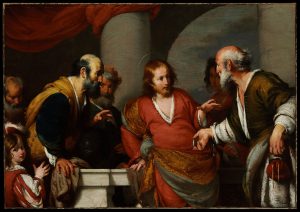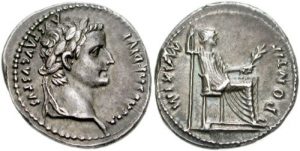Thoughts on Sunday’s Lessons for Oct. 18, 2020
First Reading (Track One): Exodus 33:12-23
God’s power for good amazes us, and we follow in faith. We’ll find variations on this theme through Sunday’s readings.

The Tribute Money (1630s), oil painting on canvas by Bernardo Strozzi (1581-1644). Museum of Fine Arts, Budapest. (Click image to enlarge.)
In our Track One first reading, we have skipped over a bloody and horrifying narrative since we heard about God’s anger over the golden calf. In those pages, a portion of the Hebrew people were told to kill 3,000 of their brothers and sisters who had worshiped the golden idol. Now Moses worries that his troublesome flock might stray again. He asks God for assurance that God will continue to lead and guide the people. God agrees, but Moses wants more: He wants to see God in God’s glory. God warns that Moses dare not see God’s face. No human can see such glory and live. But a compromise emerges: Moses may stand in a crack in a rock, protected from danger, then open his eyes for a glimpse of God’s glory and kindness from behind after God passes by.
First Reading (Track Two): Isaiah 45:1-7
It may seem unusual to read high praise for a Gentile king in the Hebrew Bible, but Isaiah offers just that in these verses. The prophet declares Cyrus, the king of Persia, as “God’s own anointed,” actually using the Hebrew word “Messiah.” How can this be? As usual with Scripture, historic context is everything. The people had been in exile in Babylon for 40 years, dreaming of the destroyed city of Jerusalem and the temple that they had lost. They had failed to love their neighbor and care for the weak and needy; thus they broke the covenant with God that had earned them the Promised Land. Now, led by the wise king that history knows as Cyrus the Great, the Persians have conquered Babylon, and Cyrus sent them home, showing that even a Persian king responds to God’s command.
Psalm (Track One): Psalm 99
In Psalm 99 the Psalmist echoes the ideas in Exodus that we hear this day. As we sing this Psalm we sing loud praise to God’s great and awesome name. We celebrate God’s justice and equity. We remember that God, leading the people in a pillar of cloud, answered their prayers, but also punished them for their evil deeds, and finally forgave them in the end. Proclaim the greatness of the Lord, our God, the Psalmist sings.
Psalm (Track Two): Psalm 96:1-13
It is likely no coincidence that the Lectionary planners chose to follow Isaiah’s praise for Cyrus the great Persian king with a brisk reminder that God remains king among all kings, before whom the whole Earth trembles. God created all things and will judge all things, fairly and with equity, the Psalmist sings. Heaven and earth, thunder and lightning, all the fields and all the forest will rejoice when God comes to judge in righteousness and truth, this Psalm portion concludes.
Second Reading: 1 Thessalonians 1:1-10
This Sunday we begin a five-week visit with 1 Thessalonians, a letter written by Paul around the year 50. Thus it is the earliest document in the New Testament. In its pages, Paul praises this small community in Thessalonika in Northern Greece, who had been persecuted for giving up the dominant Roman religion that Paul and the early Christians considered pagan. The Thessalonian people’s faith, Paul says, had inspired many converts, who were now waiting for Jesus to rescue them “from the wrath that is coming.” At this time, a bare 20 years after the crucifixion, early Christians still expected Jesus to come back soon to judge the world and establish the kingdom of God on Earth.
Gospel: Matthew 22:15-22

A denarius with the image of the Roman Emperor Tiberius. The inscription on the obverse stands for “Caesar Augustus Tiberius, son of the Divine Augustus.” (Click image to enlarge.)
For the fourth consecutive Sunday, we find Jesus in Jerusalem in the last week before his passion and death, fencing with a group of Pharisees and temple leaders who have been plotting to have him killed after his angry encounter with the money changers in the Temple. In this familiar passage they try to trap Jesus with a trick question. Depending on his answer, they hope his answer will either anger the crowds by seemingly supporting Roman taxation, or risk treason against Rome by denying the emperor’s power. But Jesus outwits them as usual, and in addition, tricks the temple leaders to reveal that they are carrying a forbidden graven image – the head of Tiberius Caesar – on the coins in their purses. Finally, when he responds, “give to the emperor the things that are the emperor’s,” Jesus leaves open the question of how much that might be … and how much of our lives, on the other hand, we should give to God.
